Last Updated on 2022-08-04 by Joop Beris
It is often said that it is impossible to prove that God doesn’t exist. After all, you can’t prove a negative, right? I think that both those statements aren’t necessarily true. I think it is possible to prove that God doesn’t exist (depending on how you define “God” ) and that it is possible to prove a negative. I’ll explain both below and give you 9 logical reasons why there is no God.
Be sure to also read this article, in which I defend myself against a refutation to this article!
Proving the negative
Let’s start with whether or not it is possible to prove a negative. Religious people, when confronted with a discussion, will often claim that no matter what you do, you can’t prove that God doesn’t exist. But is that really true? A little excursion into logic will give us the answer.
The Law of Non-Contradiction
Proving a negative is a foundation of logic. I’ve discussed the Law of Non-Contradiction here before. This is a fundamental law of logic which simply states that two contradicting statements can’t be true at the same time. That itself is a negative statement which we can prove. An object can’t be moving and stationary at the same time. A light can’t be on and off at the same time. Both are examples of negative statements which we can show to be true by simple experiment.
It is also important to be clear about what it means to prove something. The definition of to prove is:
to establish the truth or genuineness of, as by evidence or argument
Dictionary.com
We would do well to remember that except for mathematics, you can rarely prove something with 100% certainty. Especially in science, things are never definitively proven. Science will always have an open mind for better explanations and increased understanding. Most people know that vaccines work and that the Earth isn’t flat but there’s still people who doubt those things. Does this mean that the effectiveness of vaccines hasn’t been proven? Does this mean that we don’t know the shape of the Earth? No, they’ve been established to such a degree that reasonable people will accept them as proven.
Evidence of absence
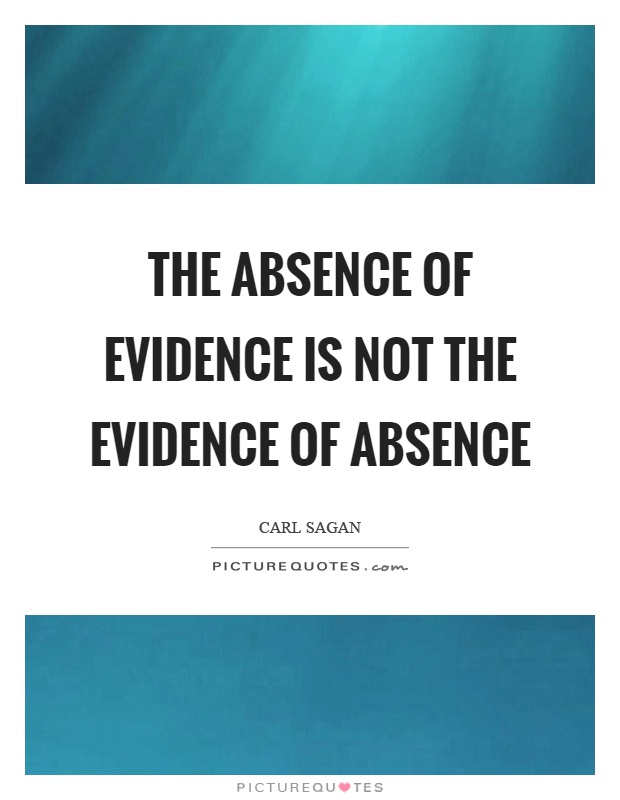
Another way to prove a negative is to show that there is no evidence of something when you’d expect there to be some. People will say that absence of evidence isn’t the same as evidence of absence but this famous saying doesn’t always work. When you’d expect to find evidence of something and yet that evidence isn’t there, you can assume that absence of evidence is indeed evidence of absence.
An example
Say that there is a small box in the middle of the road. Someone comes up to you and mentions that there is a bomb in the box. You have no evidence that there is a bomb in the box (absence of evidence). Does that mean there isn’t a bomb in the box? No, not in this case. The person could be correct and the box may contain a bomb.
If there is indeed a bomb in the box, you’d expect to find some evidence. For instance, the box would be somewhat heavy. Also, a dog trained to sniff out explosives may be able to smell the bomb. The bomb may set off a metal detector if it contains metallic components. It would show up on an X-ray.
Let’s assume for argument’s sake that you carry out the above experiments. The dog smells nothing. A metal detector detects nothing. The X-ray machine shows an empty box. And when you carefully pick up the box, it feels about as heavy as an empty box should feel. You still have no evidence there is a bomb in the box (absence of evidence) but does this mean there isn’t a bomb? Yes, at this point you may safely conclude that the person is wrong and the box is empty. You checked for evidence that should be there but isn’t. In such a case, absence of evidence does mean evidence of absence.
There are more ways to prove a negative. For more information about the logical basis for proving negative statements, here’s a comprehensive article on Fact or Myth. I think I have established by now that proving a negative isn’t just possible, it’s actually very doable.
Defining God
One of the problems we do have with disproving God is not so much that proving a negative is impossible. It’s actually that we don’t quite know what it is we are disproving. There’s no clear definition of the word God. To some, God is an impersonal force, to others God is a magical anthropomorphic immortal. This makes it difficult to know what we should be disproving.
For the sake of argument, I will be using characteristics that theologians of the three monotheistic religions (Judaism, Christianity and Islam) typically ascribe to God. These are:
- omniscience
- omnipotence
- omnipresence
- omnibenevolence
While this isn’t a proper definition, it gives us enough of a target to aim at. With that out of the way, let’s examine 9 logical reasons why there is no God.
9 logical reasons why there is no God
1. Contradictions between the major religions
There are several contradictions between the major religions that make them incompatible with one another. It’s beyond the scope of this article to do a comparative analysis of the worlds major religions but to name but a few:
- Christianity says that Jesus is God incarnate, a claim which Judaism and Islam do not accept. In Judaism, Jesus is a false prophet, in Islam he’s a prophet but not the final one.
- Islam teaches that the prophet Muhammad provided the world with God’s final revelation, which neither Judaism or Christianity accept.
- Judaism believes that God chose the Jews to be his chosen people. Both Christianity and Islam are more open to others.
There are many more contradictions and incompatibilities between the major religions, not to mention within them. Christianity alone has more than a hundred denominations, all with slightly different ideas and interpretations.
It should make one wonder that if there really is a single omniscient, omnipotent and especially omnipresent deity, how come the world’s religions aren’t more compatible, telling the same story overall? Why don’t we all believe in the same god? The major religions can’t all be true, they are too incompatible. However, logically they could all be false.
2. God isn’t the same to all
I’ve touched upon this above, in the paragraph about defining God. If there is a single omnipotent, omniscient and omnipresent God, how come “God” means something different to so many believers? Consider for instance the idea of the Trinity entertained by Christians, where God is both three and one at the same time. This notion is rejected by Islam, which holds that Allah is one, a whole. Judaism also does not have this idea of a divided yet whole deity.
In Islam, Allah is considered to be unlike any other being. In Christianity, God is thought to have taken the form of a human (Jesus), born and dying on Earth with the rest of humanity.
There is also the notion of deism, where there is a god but only as a transcendent being. The god of deism is not a person, doesn’t answer prayers and doesn’t interfere in the universe. And what to think of pantheism, where God is the universe (all that exists) and the universe is God?
So to some, God is a personal figure (or several in one) who you can speak to and who interferes in the universe, to others God is an impersonal force who perhaps began the universe and to others still, God is synonymous with the universe. Clearly, these different understandings of God are incompatible with each other. We may argue that this is due to the limitations of our brain and we simply can’t understand God at all and that is why there are such different views. But it can also mean that only one interpretation is correct or we have simply made up the gods that suit us. However, if one of these interpretation is correct, how do figure which one is?
3. Creation isn’t perfect
If the universe was indeed created by an omniscient, omnipotent and especially omnibenevolent deity, I think we could expect it to look somewhat different. Such a creator would logically create perfect beings, or at least beings that were optimally designed for their purpose and be without obvious flaws. That is not the situation we find in the world. We find evidence of sub-optimal design everywhere. So either those things were not designed by God or the God who designed them, was not omniscient, omnipotent and omnibenevolent.
Bad design
Things that can be interpreted as bad design are for instance wings which are present on flightless birds, reducing the number of useful limbs from 4 to 2. Bats have dense bones which are poorly suited for flight. Speaking of bats, bats, moles, whales, dogs and humans share basically the same bones in the forelimbs. This makes perfect sense if you assume these animals have a shared ancestor but much less so if you think there forelimbs were designed. Boa constrictors and pythons have small, vestigial legs that serve no apparent purpose. Or what to think of the Indonesian Babirusa pig that has tusks which can grow to such a length that they pierce the skull of their owner?
Or consider our own species, where the large head of a baby has to pass through a very narrow birth canal, our inability to produce vitamin C while we depend on it for survival (most other mammals can) or the presence of congenital diseases and cancers? How about our jaws which are now too small to house all our teeth?
There are literally hundreds of similar examples I could mention here but if you are interested, you may look these up for yourselves.
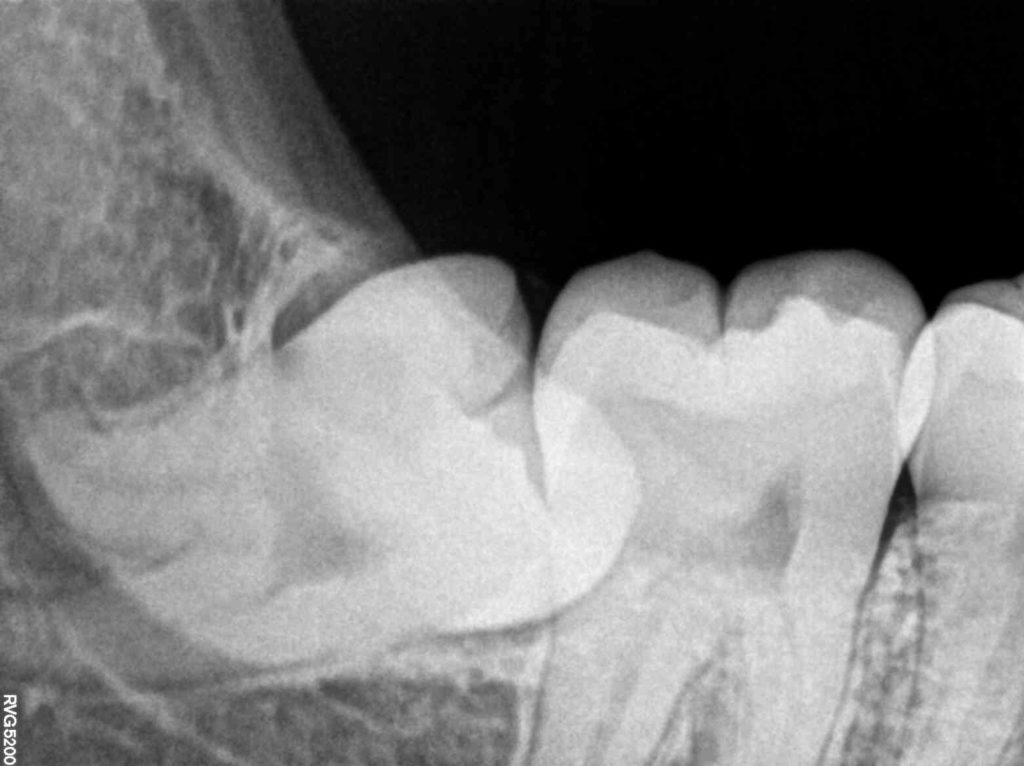
(By Nizil Shah – Own work, CC BY-SA 4.0)
Cruelty of nature
As Charles Darwin himself wrote: “What a book a devil’s chaplain might write on the clumsy, wasteful, blundering, low, and horribly cruel work of nature!” Nature is often horribly cruel and harsh. The struggle for survival is brutal and even a small mistake or imperfection can lead to a swift death. A wildebeest calf just days old being killed by hyenas, cats playing with their terrified prey before finally killing it or parasitic infections like roundworm or the Loa Loa eye worm, don’t speak for a benevolent creator.
I know that interpreting the actions of animals as cruel is looking at them through a human lens. Round worms aren’t cruel themselves, they are simply trying to survive as is the rest of nature. However, it is pretty certain that an omnibenevolent creator would not create things that cause such suffering while trying to survive. Such a creator would not create animals or plants that can only survive through the suffering and death of other beings. The fact that there are creatures like that in abundance, means that an omnipotent and omnibenevolent creator is highly unlikely.
Natural disasters
Apart from apparent poor design and the harsh existence of creatures in nature, natural disasters occur with often devastating effects. Earthquakes, tsunami, hurricanes, floods, droughts and wildfires cost the lives of countless plants, animals and people. How this is to be reconciled with an omnipotent and omnibenevolent creator is unknown. Either you have a God who causes these events for mysterious reasons, a God who allows these events to happen but doesn’t intervene or there is no omnipotent and omnibenevolent creator looking out for us.
None of above, the apparent bad design, the cruelty and harshness of nature or the devastation of natural disasters are a mystery in a universe without such a creator. We don’t need to ask difficult questions about why a benevolent God allows bone cancer in small children, allows someone to go blind due to a Loa Loa eye worm or allows someone to drown in a flood. In a natural universe, such events don’t require mental gymnastics but they can be adequately explained as natural phenomena.
4. God exists before/outside the universe
Most religious people believe that their God is responsible for the creation of the universe. This poses several logical problems for us. For one, when we say universe, we typically mean “everything that exists“. If a god created the universe, which is the set of all that exists, that must mean that this god can not be part of the universe, not part of the set “all that exists”. Logically therefore, this god does not exist. That’s not the conclusion that religious people want to draw.
To get around this problem, Thomas Aquinas postulated that God is both transcendent and immanent. God transcends the universe but he can manifest inside the universe as well. The mechanism of how this could work is unknown. However, even if we assume that this is true for a second, the problems don’t stop there.
Causality

If this hypothetical god exists as a transcendent being, outside of space and time, outside of our universe, how do we distinguish this state from not existing at all? There is nothing known to us that has such qualities and nothing that would allow us to find such things either. It’s difficult to imagine how a being so vastly removed from our reality could be the one causing our universe to exist, to actively create it even. Causality only makes sense in the framework of space-time. An action provokes a reaction, cause and effect. You can only have a cause with an effect if there is a spatial and temporal connection between the two.
No time
Time is part of our universe (the set of all that exists). If so, then before there was a universe, there was no passage of time. With no passage of time, nothing can happen because for something to happen time has to pass. If this is so, that means that the hypothetical god outside of our universe is stuck. Without the passage of time, this god is impotent. How is this god going to make a decision to create a universe, let alone create one? To make a decision, you require the passage of time. There has to be a moment before the decision is made, a moment for making the decision and a moment to put the decision into action. Without time, these moments can not occur.
It’s clear that we have many logical problems with a transcendent god being the cause and creator of our universe. A transcendent creator seems a logical impossibility.
5. The problem of evil
The problem of evil directly relates to the characteristics of God as I have listed them above. It may be summarized briefly as “If a good and all-powerful God exists, why is there evil in the world?” All three monotheistic religions hold to the idea of God being omniscient, omnipotent and omnibenevolent. This problem is called the Epicurean paradox, after the ancient Greek philosopher Epicurus, who is often credited for formulating this conundrum first.
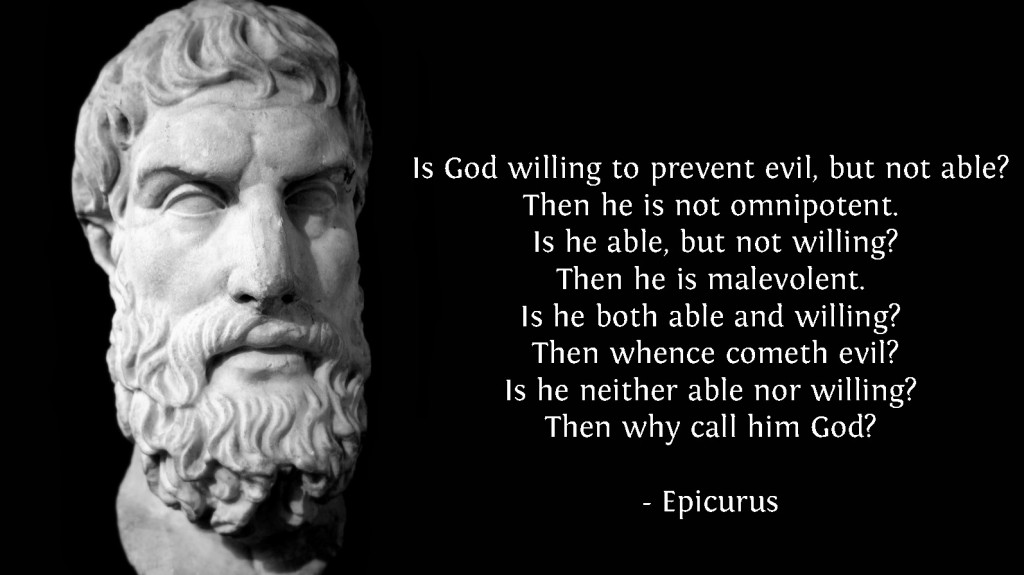
There is no easy way out of this paradox if you hold to the premise that God is omnipotent, omniscient and omnibenevolent. There have been several answers by apologists but to me, they fail to address the problem. They essentially boil down to “God allows evil for reasons we are too limited to understand” or “the evil in the world is not Gods’ fault” but both of these seem insufficient explanations. If you are an omnipotent, omniscient and omnibenevolent creator, everything is essentially your fault or your responsibility.
There’s only one explanation that is at least partly successful and that is the “free will” explanation. God wants us to have free will, which means we have the potential to do evil things. Even this only partially gets around the problem. If we have free will, an omnipotent and benevolent god would find ways to at least lessen the enormous suffering and death in the wars and genocides of the 20th century. Would such a god allow all the earthquakes, tsunami and hurricanes with all the suffering they cause? It’s still hard to reconcile the seeming indifference of the heavens with the characteristics of the god we described earlier.
6. There is no proof for the existence of God
Somewhere in the 16th century, something wonderful happened. There is no specific date to pinpoint but this century saw some of the biggest changes in the field of thought the world had ever seen. It was the start of a new era we now call the Age of Enlightenment. For the first time in over a thousand years, humanity began to value reason over faith. The catalyst for this new era was what we call “the Scientific Revolution“, a series of events that saw the birth of modern science. Fueled by the rediscovery of the works of ancient Greece, scientists changed the way they worked. They started to use observation and experiment, empiricism and reason. Armed with these tools, they developed the Scientific Method as a way to gain knowledge and figure out how the natural world works.
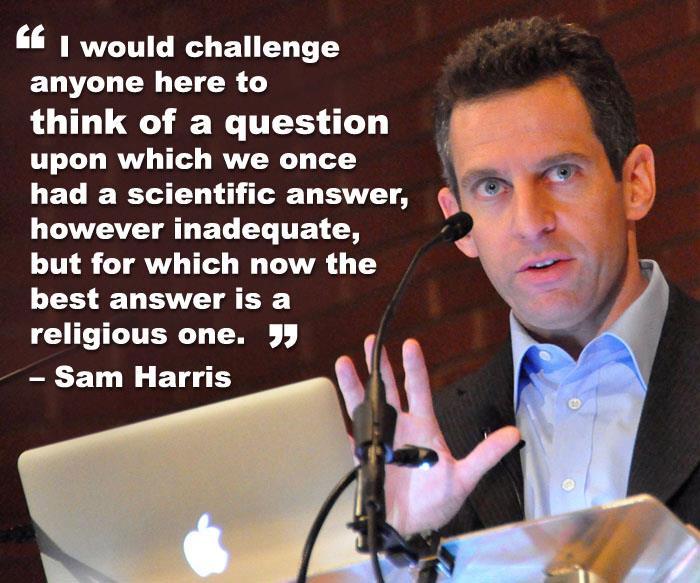
Our modern understanding of the world comes from the work of these pioneers. Wherever they explored, they found natural explanations for the way the world worked. The motion of the heavens, the tides of the sea and the workings of electricity could all be understood by natural means. Suddenly, it was no longer God who made the lightning strike or who made the planets move. These were natural forces that could be understood and predicted.
Less room for a god
This has been the story ever since. As our knowledge expanded, the need for supernatural explanations became less. By contrast, the opposite has never happened. There has never been a field of research where we once had a natural explanation but where we now prefer a supernatural explanation. We need God less and less and with theories like that of Lawrence Krauss, His involvement in the creation of the universe may have been ruled out as well. Invoking God for things we do not understand, is simply a God of the gaps argument. And the gaps are getting ever smaller.
If the universe was the product of divine creation, the result of some miraculous event, could we expect to make sense of it? Would the way the universe worked not exceed our limited mind? Granted, there are things we do not understand. We don’t know how life began, we don’t know the nature of dark matter or dark energy. On the other hand, we have absolutely no indication or valid reason to assume that there are supernatural processes at work.
7. Our knowledge of God isn’t improving

From as far back as we have writing that we’ve been able to read, we see evidence of humanity trying to understand the divine. Theology, the study of the divine, is an academic subject in which people can obtain a degree. Despite thousands of years of effort on the part of theologians, our understanding of the divine and of God has not improved. We are still guessing about Gods motives and his (or her?) nature. To my knowledge theology is the only academic subject where the existence of the subject is assumed rather than established.
If however there really was a God who is omnipresent and who wishes us to know about Him, why has our understanding of this God not improved over time? Why are we still none the wiser about Gods motives? Ever since humanity applied the scientific method to the subject we wish to study, our understanding of it has grown. We now know more than ever before about geography, cosmology, sociology or history. Perhaps that’s because these academic subjects actually exist and don’t have to be assumed to exist.
8. The vastness of the universe
When the holy books of the three major monotheistic religions were written, humanity understood little about the universe and our place in it. To them, the Earth was a great disc, with a heaven above and an underworld below. The sun, moon and stars were simply lights set in the sky. Even to Islam, the youngest of the three, the Earth is flat. In a cosmology so simple, it’s not surprising that the God who created it all, took an interest in the affairs of humans on the great disc-shaped world that He created. It was after all the centrepiece of creation.
The universe is vastly larger than previously thought
However, if we fast forward to today, things are very different. Our understanding of the universe and our place in it has grown a lot and this vastly diminishes the significance of planet Earth and of humanity in the grand scale of things. We now know that our Sun is not a light in the sky but a star. This star is part of our galaxy, which in turn is part of a cluster of “local” galaxies. It is estimated that our galaxy alone may hold as many as 100 billion stars.
We don’t know how many galaxies there are in the observable universe but a conservative estimate would place the number at 10 trillion galaxies. At 100 billion stars per galaxy, that would put the total number of stars in the observable universe at 1.000.000.000.000.000.000.000.000, or a quadrillion stars! Even if not all of these stars have planets, the number of existing planets is even higher than that!
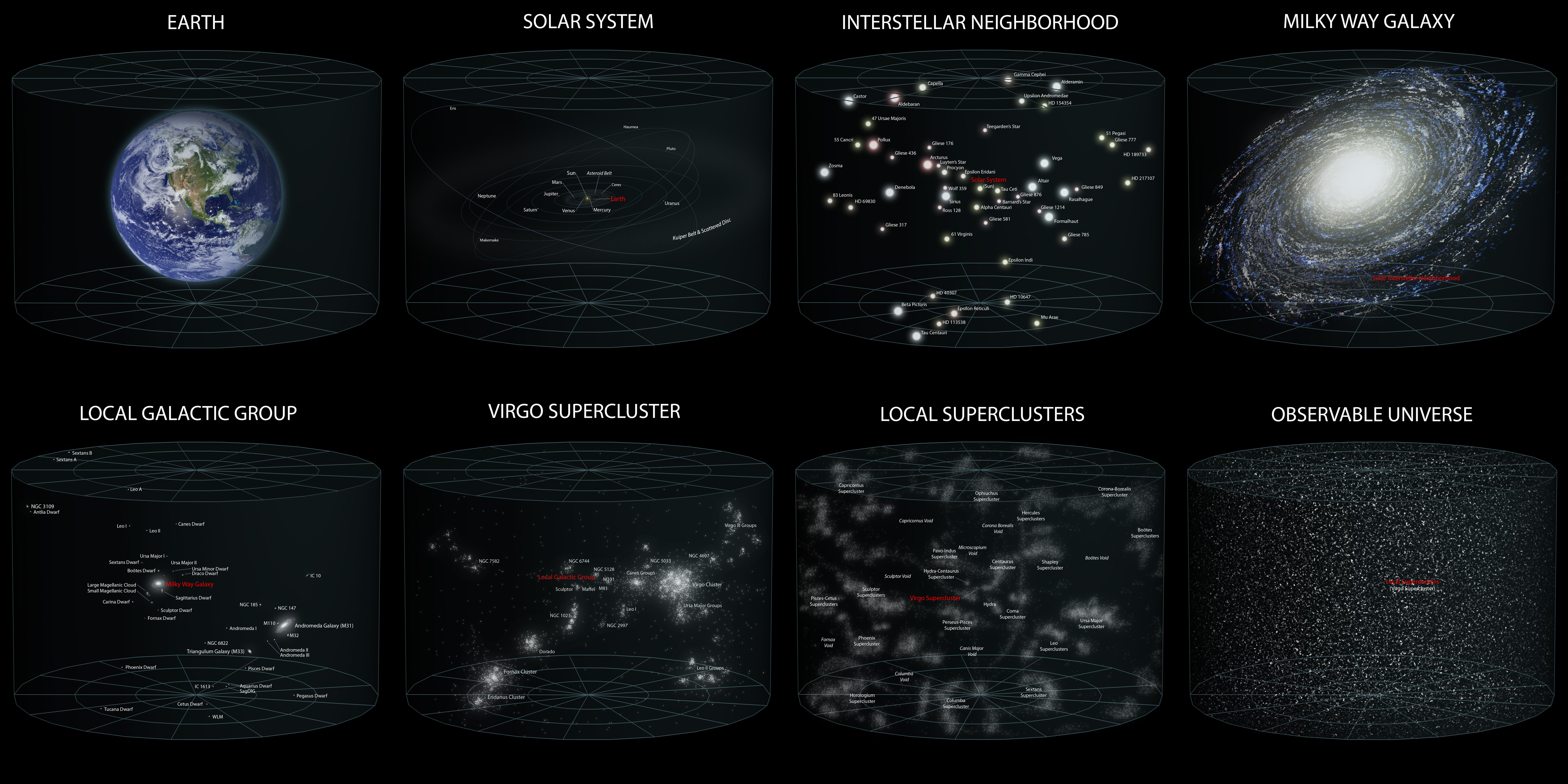
That seems like an awful lot of wasted space for a God to create if all that mattered was us here on planet Earth. Considering the vastness of space, it seems much more logical to conclude there never was a god who created it all for us, with our best interests at heart.
9. Logical problems with the attributes of God
There are logical problems with the attributes of God as well. As you’ll remember, the attributes mostly attributed to God by the three major monotheistic religions are:
- omniscience
- omnipotence
- omnipresence
- omnibenevolence
Superfluous attributes
The first and mostly minor objection is that some of these attributes are superfluous. For instance, omnipotence actually includes omnipresence. An omnipotent being would be able to be everywhere at the same time. The same can be said for omniscience. So really, the only attributes we would need, are omnipotence and omnibenevolence.
Problems with omniscience
Another problem with these attributes is perhaps more serious. They appear to be logically inconsistent. Take for instance the attribute omniscience. This is usually thought to mean that God knows everything. If God knows everything, that means that he also knows what happens in the future. If that is true, that means that the future is fixed and unchangeable. Not only does this mean that we humans are unable to make our own choices, it also means that God himself can not make his own choices or at least not change the choices he’s going to make.
There are more problems with omniscience. Certain knowledge can only be obtained by experience. For instance, you can only find out what it feels like to commit an evil act by actually committing an evil act. An omnibenevolent god is unable to commit evil acts so by definition, this God would not know what it feels like to commit evil and so can not be omniscient.
Problems with omnipotence
That brings us neatly to omnipotence. If God is both omnibenevolent and omnipotent, is it possible for this God to commit an evil act? If yes, he is not omnibenevolent but if no, he can not be omnipotent. This is similar to the Stone Paradox, where we ask the question “can God create a stone that is so heavy that he can not lift it?” Whatever your answer to this question is, it will mean that there is something God can not do, effectively proving that omnipotence is not possible, at least not any more when you ask this question.
The problems with omnipotence don’t stop there. If we take it to mean that God can do everything he wants to, does that mean he can do the impossible? Can God create a light that is both on and off at the same time? Can he create a stationary moving object? Or can he make it so that 2 + 2 = 5? These are logical impossibilities but are they also impossible for an omnipotent God?
Problem with omnibenevolence
We’ve already touched upon the problems with omnibenevolence above, when speaking about the Problem of Evil. Why would a world created by an omnipotent and omnibenevolent God have so much pain, misery and suffering in it?
While these may appear to be simple questions, they have been a matter of debate for theologians and philosophers for centuries. There are no easy answers to the problems with divine omniscience, omnibenevolence and omnipotence. While on the face of it, it seems that a God would need to have all these traits in order to be God, in practice it appears that these traits are logically inconsistent and in some cases even in conflict with one another.
Conclusion
This concludes my 9 logical reasons why there is no God. I think I have successfully shown that it is possible to prove a negative. Have I also managed to successfully prove that the God of the major monotheistic religions doesn’t exist? Well, that depends on how you interpret the meaning of “prove” and how you define “God”. Did I prove beyond a doubt that a god of some sort doesn’t exist? No, I don’t think I have. However, looking at the logical problems regarding the attributes typically associated with the God of the three major monotheisms, I think that a reasonable person would be justified in concluding that this particular God does not exist, at least not in the way He is generally believed to be. I think that conclusion to be just as solid as the conclusion that unicorns, pixies and Santa Claus don’t exist.
What do you think? Do you agree with my 9 logical reasons why God does not exist? If no, why not? Kindly leave a comment below.



Former Christian now am agnostic. I find it interesting that each side of this subject thinks they have liogically figured it all out. To a degree you are basically confusing the Judeo/ Christian God with any God. There could be a god or gods that are not all knowing, all present, all powerful and all benevolent. I question why things are the way they are if indeed that God does exist and have a hard time with it and question his existence but I am a very finite being. The crux of Christianity is that you must believe in Jesus which is a very difficult position to be in as how can I believe when I am unsure. I have a learning disability and was not able to finish your whole list but I’m going to comment. You made the comparison of theism to the bomb in the box. That is not necessarily a fair comparison. For instance if no one is able to get to the box there is no way to prove there isn’t a bomb in it or that there is. You see, even though there is no way to know for sure God or any God exists doesn’t mean he/they don’t. If he/they don’t show themselves it may be because he/they can’t for some reason or reasons or they they have their reason/reasons that they don’t show up. Therefore I find atheism a non-tenable belief as I find dogmatic belief in a god/gods non-tenable at least at this time. It could change. You also are supposing that if the Judeo/Christian God exists what exists should be a certain way and since it isn’t God can’t exist which is a false belief.
I agree with you there. Anyone who claims that they have all the answers, is operating under a misapprehension or they are not telling the truth. That being said, I think I have made a series of logical and coherent arguments.
I’m not, I am specifically addressing that belief in a god. That is the kind of god most people mean when they talk about god. Of course, we can imagine a multitude of lesser deities as people did in the past, when there were lake gods, sky gods, etc. Some of my arguments apply to any kind of god, this is correct.
I think you’ve misunderstood my example there. The example is merely to illustrate that in certain situations, if we have absence of evidence, that is indeed evidence of absence. I was not comparing theism to a bomb in a box.
This is true. But if we have an absence of evidence for the existence of a god, is it logical to act as if there is one? Would we not need some kind of evidence before we accept this outlandish proposition?
Atheism is not a belief. It is the absence of belief in a god or gods. If you are agnostic about the existence of a god then you lack belief in a god. Hence you are an atheist. See for more here: https://www.beris.nl/what-is-atheism/
That is misrepresenting of what I wrote. I said that if what people say about the Judeo-Christian god is true, we should expect the world to be a certain way. Since the world is not that way, that is an indication that the Judeo-Christian god does not exist as people believe in him. It is not conclusive proof, but it is an indication.
Thanks for engaging with my writing!
I don’t know why, but I love conversations about whether God exists or not. The older I get, the more I marvel at those who don’t look at the facts. You have listed several reasons for God not existing and there’s one more I’d like to add to the conversation. Humans are expected to use their common sense/ability to reason in all areas of their lives such as money, parenting, career, etc. But when it comes to religion, there are those that want to believe in “magic” – things that have no explanation or proof but makes them feel good to hear about it. Puzzling, to say the least.
My one argument for no god, is fossils. If a person believes in fossils (I think most people do) then they, probably understand also, that fossils have to be a minimum of 10,000 years old before accepted as one. When you Google “Age of the earth according to Christians” the answer “6,000 years” pops up. If the earth is only 6,000 years old and fossils are 10,000+ years old…then there’s an obvious gap.
A visit to the Grand Canyon in Arizona will tell you that it started forming 17 million years ago yet Christians are saying “Nope, no more than 6,000 years ago.”
Author Marshall Brain has a wonderful website http://www.godisimaginary.com that goes into more reasons for this obvious argument that there is no God.
Hi Don, thanks for your comment. Yes, fossils are a good argument for the Earth being more than 6000 years old. Actually, all of the sciences point to the Earth being older than 6000 years and most Christians have accepted that fact by now. It’s only the most fundamentalist Christians, those that take the Bible or at least the book of Genesis literally, that still believe in young Earth creationism.
It’s not such a good argument against the existence of god, I’m afraid. It’s possible to believe in an old Earth, evolution and even the Big Bang and still believe in a god.
Fundamentalists do not necessarily hold to a 6000 year old earth. Only that humans seem to have been here for that long following genealogies. Also, if God created Adam and Eve with age, be could have created the earth with age.
1. Not all things in life other than religion require proof. A lot of things are done on faith. Like marriage or choosing to have children. Or moving to someplace new because you believe without proof that they’re good choices. True they may not involve magic but still some faith. 2. If God or any gods exist many things may not be likely but possible. I mean plant a seed and get a flower or fruit…magic. Fertilize an egg and get a human being…magic. Put wings on a plane chassis and fly or a parachute or a hang glider on a human…magic. They’re only taken for granted because we’ve seen them. Years ago a human “flying” would have seemed like magic. 3. I was a Christian for many years but now agnostic. I did not receive Christ because I wanted to believe. I just at the time did believe. I would love for God to not exist and find no comfort in the idea so don’t categorize all theists as those who find comfort in God. They may just believe he/they exist whatever they believe him/them to be.
Those analogies don’t hold up, I’m afraid.
While we can’t be absolutely certain about things, people generally don’t enter into marriage blindly. They have chosen a partner with care, spent time with said partner and know them very intimately. That is not faith, because the partner has demonstrated commitment, we know what they are like, etc. We have good reasons to believe they are a good partner. So we don’t enter into marriage on faith but on the trust that we have made a good choice.
The same is true for having children or moving someplace else. We know a lot about having children, we know our partner, we may get a medical checkup, we have prenatal care, postnatal care. That’s not faith.
When we move someplace new, we don’t throw a dart on the map and say “I’ll move there”. We carefully select the place and then move. That again is not faith, we trust that we have made a good choice.
We don’t use the word “faith” when we have knowledge.
Well I disagree with you. When a animal dies its body is broken down by fungi and scavengers to be reused which is then added to the soil which goes back to plants.Perfect means to point where it cannot get better, Does rain not follow a cycle isn’t that perfect if not what would you change, all life start of small( trees=seed,animals=reproductve cells)
if there was no creator then why does everything follow this pattern, give me an example otherwise. You speak of bad design, most animals have bones protecting their organs and skin protecting there bones if that isnt perfectly design then how would you make it better? God made man that man should live forever but because man sinned death came in the world and sickness. If God didn’t want a sinless world would he send his own son to die for that purpose . More ever the bible proves facts before science discovers them jobs 26:7 “he spreads out the northern skies over empty space; he suspends the earth over nothing. “Lo and be 1687 Isacc Newton discoverd gravity which led to earth being found in suspended in nothing (space)shown. Job 36:27-28 ” He draws up the drops of water, which distill as rain to the streams ; the clouds pour down their moisture and clouds pour down their moisture and abundant showers fall on mankind.” The first part evaporation, the second preciptation, the third condensation, isn’t this system perfect according to our knowledge. Also think about it any scientists can tell you that a bomb needs to be constructed accidentally or purposely before it can explode then tell me with your logic how does a big bang explodes if there wasn’t anything to construct it from,there was nothing, if you truly want proof that God exist then search within yourself and for the reason you haven’t found him is because you refuse to see him
That’s fine. I just wish you had offered some better grounds for disagreement.
Why do you call the water cycle “perfect”? In what way is it perfect? Dead animals are consumed, therefore god? Water evaporates and then falls back to the ground as rain, therefore god? Those are seriously your arguments for a god? There’s no need for a deity in all of this. The cycle of water is a natural process, simple physics. Evolution by natural selection adequately explains the existence of scavengers, with fungi animals and plants adapting to reuse the nutrients from the dead.
What pattern are you referring to, things growing from small beginnings to large? Biology explains that. Since all life today evolved from a shared ancestry, life follows the pattern of sexual reproduction, where amounts of genetic information are exchanged during sexual reproduction. But that’s not true for all animals or plants. You have heard of asexual reproduction?
Actually, most animals don’t have bones at all. Most animals are bacteria which neither have an endoskeleton or an exoskeleton. Of the animals that do have a skeleton, most of them have an exoskeleton (crustaceans, insects, etc.). It’s only the minority of animals which have an endoskeleton. So I don’t know what your point is? Animals have evolved to fit a certain niche. Many of those niches don’t require them to have a skeleton or only a rudimentary one. Again, this is explained by evolutionary biology.
This is only the case in your preferred mythology. I do not accept your mythology because of lack of evidence. Have you seen the poor logic and how god could easily have avoided the whole fall from grace and sending his son?
Isaac Newton was the first person to describe a law of gravity, he didn’t discover gravity. But forgetting that, your reading of that verse is a post-hoc interpretation. Space isn’t nothing and the Earth isn’t suspended over nothing. It’s caught in the gravity of the sun. If the bible had accurately described gravity and how it works, then you might have a point. By the way, Job 26:11 speaks of the pillars of the heavens. Care to point out their location in the cosmos?
You can see the process of evaporation and cloud formation in nature, same as rain. You mention this verse because? What is perfect about it? Why does perceived perfection require the involvement of a deity? Why is it your specific deity?
The Big Bang wasn’t a bomb explosion or even an explosion at all. Please read a current cosmology book, not religious propaganda material.
You didn’t read how I became an atheist, did you?
Sorry Rhy, but you’ve left an utterly unconvincing set of arguments. Like I said, it’s fine to disagree with me but please find a better set of arguments if you hope to convince someone like me.
[…] bound to do so. Anything less would be immoral. Since an all-powerful god is nothing if not able, the question of why there is evil and suffering if the Christian narrative is true, is actually a fair question.First of all, what motive would a […]
[…] many of the claims of Christianity are not based on evidence. Instead, they are based on bad logic, faulty reasoning and […]
[…] In reality, no one can know what God wants or what He has in store for you or anyone else. That’s because God does not speak plainly to people, not even to the most sanctimonious of Christians. He doesn’t speak at all because the Christian God doesn’t exist. […]
[…] say that the statement is certainly an exaggeration but not necessarily a fallacy. It doesn’t take complete knowledge of the universe past and present to disprove the existence…. Should those claims be inaccurate, we may dismiss the claims about the deity and by doing so, […]
I’ve read your article and the points you raise are not new. I also don’t think all of your arguments work.
You claim that there is bad design in nature and that this shows there’s no intelligent designer but that’s not necessarily true. Designs could have become less optimal over time, due to climate change and other situations. So while these animals once were optimally designed, their design no longer matches current circumstances.
The problem of evil also isn’t conclusive because we can’t know whether or not God has chosen to allow suffering for a reason. By our very nature, we are limited beings while God, by His nature, is not a limited being. We can’t see all situations, attributes, causes and effects but He can. So we can’t say that “God wouldn’t do this” or “God would do that”.
That brings me to my final point. Your attempt to refute God by using logic is actually self-refuting. Since logic comes from God, it is itself proof that God must exist. We could not use logic without God. You might want to read this article https://answersingenesis.org/is-god-real/what-is-the-best-argument-for-the-existence-of-god/
Sorry, I seem to have missed your comment when you made it. Allow me this belated reply nonetheless.
I am very much aware that most of these arguments aren’t new. In fact, the problem of evil predates Christianity. The age of the arguments doesn’t matter, what does is the theistic reply to these arguments.
Before we can infer a designer, we must do more than make the assumption that plants, animals or humans are designed. We will have to prove they were designed before we can say with confidence that there must be a designer. As far as I know, no one has ever been able to prove the assumption of design. Therefore, we can not even begin to assume a designer, much less say with certainty that there was one and that the designs of this designer became less optimal over time.
If we make the assumption that a god has certain criteria, we can say that this god would or would not do something. The problem is that we do not have a definition of god that is accepted by all of theism. We do not have a set of properties that this god does or does not have. To assume that a being without a definition, without a clear set of properties, a being so far not proven to exist, would have reasons to allow evil which we can not understand, seems to me to be a leap that one cannot make. None of these ifs are necessary in a world that has evolved by natural means. We have no need for baseless assumptions then.
I have read the article you linked to. I already posted a refutation to it here: https://www.beris.nl/what-is-the-best-argument-for-the-existence-of-god/
In short, the Answers in Genesis article suffers from a critical ambiguity fallacy so it doesn’t work. It also doesn’t support the Christian god, it can be used to “prove” any god, so it’s inconclusive as well.